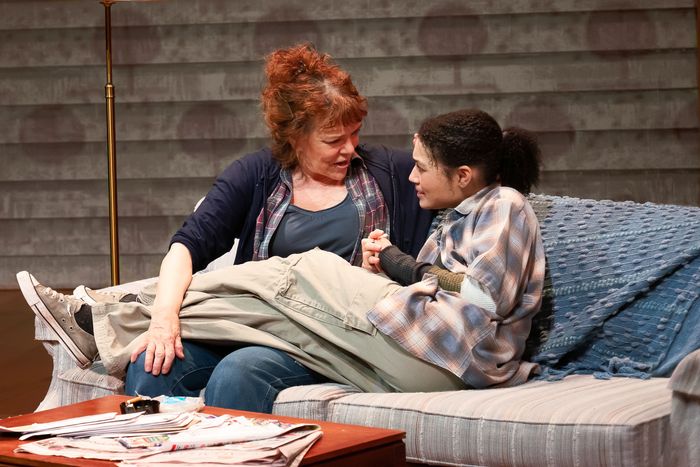
According to the experts over at Harvard, Gallows Hill, where they hanged accused witches in Salem, is now the site of a Walgreens. But Becky Nurse knows better. She’ll tell you that Gallows Hill is actually closer to the Dunkin’. Becky’s a Salem local and a descendant of the executed Rebecca Nurse who happens to work at the local museum. She’ll tell it to you straight, even if it means ad-libbing a theory or two about how the “witches” may have been eating rotten rye bread, or dropping a “fuck” or two into her guided tours.
As played with r-dropping Massachusetts accent commitment by Deirdre O’Connell, Becky’s a rambunctious, unlucky figure. She appears before the audience giving one of those tours, which quickly goes awry, loses her job at the museum, and then eventually resorts to actual (or is it?) witchcraft in order to try to secure a new one. Sarah Ruhl, who wrote Becky Nurse of Salem, has a lot on her mind and keeps throwing new ideas into her cauldron as the play builds through the first act: the misogyny inherent in depictions of the Salem witch trials, the invocation of witch hunts in contemporary politics, even the opioid epidemic. That many ingredients makes for a disjointed brew, but O’Connell provides the binding force to keep it nearly together.
O’Connell’s a patron saint of Off Broadway who’s already been onstage in one production (Corsicana) and now this second one just six months after winning a Tony Award for the unnerving summoning act she pulled off in Dana H. As Becky, she’s all realism, slouched back into her heels, hands in the pockets of an old sweatshirt, little fidgets in the eyes. She’s the kind of person you readily believe has an intellect she never fully got to exert because life got in the way. Now she grumbles at her uppity professorial boss (Tina Benko, in a threatening tight updo) and sneaks off for a ploughman’s lunch at a bar run by her old friend Bob (a calming Bernard White). She would like to just get on with her life, but she’s on an unlucky streak. Maybe that’s connected to the death of her ancestor, who appears on stage in the form of a life-sized wax statue that rolls with delightful smoothness across Riccardo Hernández’s wood-floored set.
That glowering, gliding pilgrim figure is just the beginning of the strangeness to come once Becky starts paying a local witch to clear up her curse and help her get her life on track again. That witch is played by Candy Buckley with wild, spidery hand gestures and delightfully free-form approach to the accent (she says “cuhrse” for curse, and I can’t even try to render her way of saying “aura”). She promises good things to Becky in exchange for several hundred dollars, and instructs her to complete various tasks in order to ensure their success. Becky, at loose ends, ends up hiding a crystal in her granddaughter’s Wiccan boyfriend’s backpack, sprinkling holy water around her boss’s desk, and dabbing an ointment mixed with vaginal juices on herself, all in order to seduce Bob. By the end of act one, she’s in jail and hallucinating that she herself is part of a witch trial, in part because she is in withdrawal from pain pills.
Suffice it to say that no one would categorize Becky Nurse of Salem as subtle, not that subtlety is one of Ruhl’s goals with the work. Ruhl’s working in broad strokes, trying to cover a large swath of material. Ruhl, like Becky, has an aversion to The Crucible. In a Lincoln Center Theater handout, she describes her lightbulb moment upon having Brandon Jacobs-Jenkins point out to her that Arthur Miller wrote it while infatuated with Marilyn Monroe, and getting fed up with the idea that the best-known depiction of the Salem Witch Trials was written by a horny older guy. (One of Becky’s cleverer subplots involves her granddaughter’s high school production of the play being directed by a shady priest.) It also might not surprise you to discover that Becky was originally aiming to premiere in fall 2020 before the pandemic, and that it’s set in the fall of 2016, with glancing references to Trump in the background. It can feel #resistance-minded, hitting a lot of the most commonly accepted liberal talking points. At one point, Becky herself curses out the Sacklers.
O’Connell’s performance, however, draws Ruhl’s work away from those polemics, toward a character who is more of a real person than a gesture. Rebecca Taichmann’s direction also tends to emphasize the other characters’ smaller human foibles, with Benko nearly falling into a toilet while pontificating, or White getting all enthusiastic about toast. That line about the Sacklers comes amid a big rangy monologue in act two that O’Connell pulls down to earth in a way that helps it feel like the outburst of her character, not just the playwright. It’s a play that wouldn’t work without her as the star, and has perhaps been weakened in development because it can rely on O’Connell can execute so much. Most other actresses would need more to cling onto.
To give Ruhl credit, these are unsubtle times, and she’s hit on something with the strangeness of Salem itself. It’s a town that bonks your head with metaphors: The hanging grounds turned Dunkin’, the local Marriott having to deal with packs of Wiccan teens, the ultra-mundane layered right over the occult. Becky’s life can’t help but rhyme with the experience of her great-great-great etc. aunt because the same American currents of fundamentalism and suspicion seep out no matter how many times we pave over them. When you live with symbolism clanging all around you, the focus just needs to be a little more on the living and less on the symbolism.
Becky Nurse of Salem is at the Mitzi E. Newhouse Theater.


